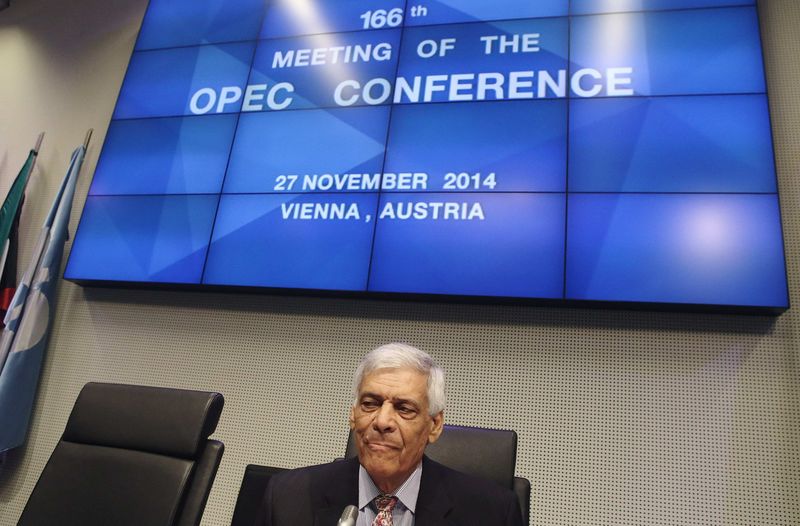By Alex Lawler, David Sheppard and Rania El Gamal
VIENNA (Reuters) - Saudi Arabia blocked calls on Thursday from poorer members of the OPEC oil exporter group for production cuts to arrest a slide in global prices, sending benchmark crude plunging to a fresh four-year low.
Brent oil
This outcome set the stage for a battle for market share between OPEC and non-OPEC countries, as a boom in U.S. shale oil production and weaker economic growth in China and Europe have already sent crude prices down by about a third since June.
"It was a great decision," Saudi Oil Minister Ali al-Naimi said as he emerged smiling after around five hours of talks.
OPEC said in a statement that members had agreed to roll over the ceiling of 30 million barrels per day, at least 1 million above OPEC's own estimates of demand for its oil next year.
"It is a new world for OPEC because they simply cannot manage the market anymore. It is now the market's turn to dictate prices and they will certainly go lower," said Dr. Gary Ross, chief executive of PIRA Energy Group.
The wealthy Gulf states have made clear they are ready to ride out the weak prices that have hurt the likes of Venezuela and Iran - OPEC members which face big budget pressures, but cannot afford to make cuts themselves. Venezuela and Algeria had calling for output cuts of as much as 2 million bpd.
Venezuelan Foreign Minister Rafael Ramirez said he accepted the decision as a collective one and hoped that lower prices would help drive some of the higher-cost U.S. shale oil production out of the market.
"In the market, some producers are too expensive," he said.
The OPEC statement made no mention of any need for members to stop overproducing, nor of any extraordinary meeting to reconsider the ceiling before a regular session next June.
BATTLE OVER MARKET SHARE
The Organization of the Petroleum Exporting Countries accounts for a third of global oil output.
Gulf producers could withstand for some time a battle over market share that would drive down prices further, thanks to their large foreign-currency reserves.
Members without such a cushion would find it much more difficult, as would a number of producers outside the group. Russia's rouble, which has been sliding for much of this year, extended losses on Thursday to trade more than 2 percent lower than the previous close against the U.S. dollar.
Russia is already suffering from Western sanctions over its actions in Ukraine and needs oil prices of $100 per barrel to balance its budget.
A price war might make some future U.S. shale oil projects uncompetitive due to high production costs, easing competitive pressures on OPEC in the longer term.
"Why would Saudi cut production in the current environment? Why would they want to support Iran, Russia or U.S. shale producers? So they must have decided: let the market establish the price. Once the market goes to a new equilibrium, prices will go higher," PIRA Energy's Ross said.
Kuwaiti Oil Minister Ali Saleh al-Omair said OPEC would have to accept any market price of oil, whether it were $60, $80 or $100 a barrel. Iraq's oil minister, Adel Abdel Mehdi, said he saw a floor at $65-70 per barrel.
"We interpret this as Saudi Arabia selling the idea that oil prices in the short term need to go lower, with a floor set at $60 per barrel, in order to have more stability in years ahead at $80 plus," said Olivier Jakob from Petromatrix consultancy.

"In other words, it should be in the interest of OPEC to live with lower prices for a little while in order to slow down development projects in the United States."
(Additional reporting by Amena Bakr and Shadia Nasralla; Writing by Dmitry Zhdannikov; Editing by Dale Hudson, David Stamp and Robin Pomeroy)